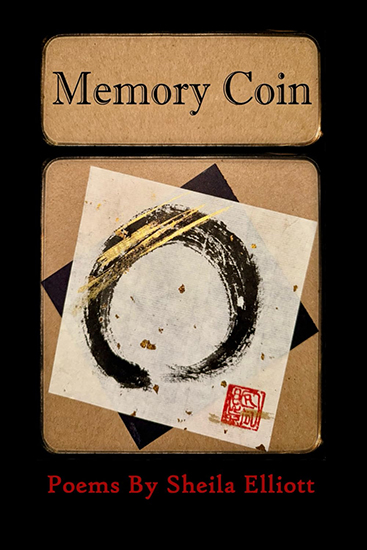
Memory Coin: Poems
by Sheila Elliott
49 Poems ~ 55 pages
Price: $15.00
6 x 9 ~ Perfect Bound
Cover art by Monica Cardestam
Cover layout by Jennifer Dotson
Publisher: Highland Park Poetry Press
ISBN-13: 979-8-9997122-0-2
To Order: Amazon.com
Reviewed by Michael Escoubas
It is little wonder that Memory Coin, by Sheila Elliott, was awarded first place in the prestigious Prairie State Poetry Prize competition for best first or second collection. As competition judge Jan Chronister states: “Sheila Elliott meditates on everyday places and events that connect us.” When I reflect upon my reasons for writing and reading poetry, that statement by Chronister, says it all! A poem must capture my interest in the telling moments of life, in the things, people, and places, which define who I am. Elliott understands “places of the heart.” My goal is to show several examples that evidence Sheila Elliott’s heart, a heart that reaches mine.
Notes on Titles and Structure:
My prereading of Memory Coin immediately captures my attention by the poet’s skill with titles. “Tea Leaves and Cards in the Reliance Building.” What’s this all about, I wonder? Then I encounter, “Gentle as Ice,” … How can ice be gentle? “Enduring Uncertainty,” “Prescient Frost,” “The Rules of 2 A.M. Conversations,” and “Let’s Meet Beneath the Clock.” I wonder what goes on under the clock!
Elliott is a free-verse poet, as well as a poet skilled in rhyme. Her free-verse style is never boring because she uses quatrains, couplets, innovative lineage, and stanzas that run long between breaks. A few poems run solid. “In Praise of Ordinary Things,” is a well-written prose poem. “Autumn Leaves, Last Leaves,” is an example of innovative line endings as well as nicely executed rhyme:
Autumn leaves, last leaves,
winnowed boughs, thin-sleeved,
begin
tossing, they heave
but in the end, cleave.
To win
a chance is to believe
there’s a sense to this weave
and spin.
But darkness lets us see
how strong light can be,
trees, trim–
they’re set sparsely
yet perfectly,
within
the space they’re meant to be,
sentinels, with exacting gravity
within.
It is Elliott’s superb use of the imagination that stands out. Is Nature harboring within its seasonal cycles something we humans should notice about ourselves? If there is an issue here, Elliott does not do our work for us. Like any great poet, she is bold enough NOT to solve a problem. She trusts her readers to ponder for a little more depth.
Notes on Nature and the Human Condition
Sheila Elliott paints pictures with words. Most good poets do this. However, Elliott excels. Among the harder things to do in life is to wait. In a mere five couplets she portrays a merger between Nature and the human spirit:
What it Means to Wait
Where ridges cascade into hollows, there
winter
reveals itself. Aging snow ponds, and gray
shadows,
thinner than the twining trees above, lay
scattered
discreetly. There, wind now and forever
unseen,
whispers something about the meaning of
waiting.
I can see it. An intimation of desolation, long-standing snow, unremitting gray interacting with barren boughs, the incessant wind dominating the scene, its whispers portending change, the unnamed (but assumed) human presence . . . waiting, waiting, waiting.
“Coulda’ … Shoulda’ ” draws a corollary between natural-world phenomenon and the human spirit. Elliott eloquently captures an anomaly of human experience.
Never wanted things
this way, but no one
tells you that the slick,
secret skin of the great
and narrow road can be
followed for too long, or
how ice you can’t even see
can snap back at you
like a rubber band, spin you
‘round, slow you down, then
set you face-to-face
so you’ve got to meet the
golden eyes of the demon
that is the wish
for the past’s revision.
How pointedly this poem speaks to real-world issues for this reviewer.
“Her Passing” is an elegy written for the poet’s mother. It is an unconventional sonnet which scans: aaa / bbb / ccc / ddd / ee. However, it is the tenderness felt by Elliott that speaks to my heart.
When it came to the end,
when we were sure she wouldn’t mend,
I didn’t try to pretend–
It was me crossing in a way, too,
leaving with reluctance, away and through,
though I had a life’s work still to do.
Years have gone by since that night.
I’ve seen now, death is an invisible sight,
a flat line that intensifies the light.
And though she passed when I was grown,
time since has surely shown
one loss is not to be outgrown.
And coping becomes the mask
When we’re not up to the task.
One task, dear reader, that you are up to is ordering a copy of Sheila Elliott’s award-winning collection, Memory Coin. A mere $15.00 will transport you to a poetry banquet that will satisfy your hunger for spirit-nourishing food.
|


